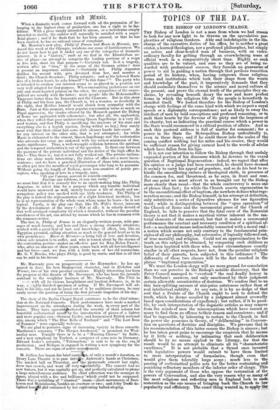hratrts unit Visit.
When a dramatic work comes forward with all the pretension of belonging to the highest class of production, one has a right to be fastidious. With a piece simply intended to amuse, or a melodrame simply intended to startle, the auditor will naturally be satisfied with a superficial glance ; and if he finds that he has been amused, or that he has been startled, he has no rational cause of complaint. Mr. Marston's new play, Philip if France and Marie de Meranie, produced this week at the Olympic, awakens our sense of fastidiousness. We do not know how to put it under any one of the categories of dramatic interest. Is it a "history," such as we find in the Elizabethan series of plays—an attempt to comprise the leading portions of a. reign in five acts, short for that purpose ?—Certainly not. Is it a tragedy,
written after an "idea," in the sense of the German critics ? does it present an important collision ?—Certainly not. Philip Augustus dislikes his second wife, gets divorced from her, and marries a third ; the Church thunders ; Philip submits ; and as his beloved Marie dies of a broken heart, he asks himself" Is this fame ?"The party who is intended to awaken our interest seems to us placed in a position not very well adapted for that purpose. When encroaching prelates are on one side and stout-hearted princes on the other, the sympathies of the unprejudiced arc usually with the latter ; most people like the Hohenstauffen Emperors better than the Innocents and the Clements. But in this story
of Philip and his faux pas, the Church is, for a wonder, so decidedly in the right, that Hobbes himself would shrink from sympathy with the State. Just at this moment, when popular conversation turns so much on Papal aggression, the tirades uttered by the Monarch against the Bishop of Rome are applauded with vehemence ; but after all, the applauders, when they reflect that poor uninteresting Queen Ingelburge is a very Mused woman and that Philip is sacrificing the interests of his state and everything else to a boyish passion, (being withal no boy,) they surely must wish that their client had come with cleaner hands into court. As for any interest on the other side, that is not attempted ; for while Marie is elaborated to the utmost, Queen Ingelburge and the ecclesiastics who advocate her cause are endowed with the veriest minimum of dramatic significance. Thus, a well-wrought collision between the spiritual and the temporal authorities is out of the question. Is there one between the passions of the private individual and the duties of the high office he fills ?—This there is; but it is not fully worked out. The private inclinations are alone made interesting ; the duties of office are a mere inconvenience; and we have a practical illustration of those trite sentiments, so often put into the mouths of royal personages who long to be peasants. Without going the length of Boileau, most non-amative of poetic preceptors, who, speaking of love in a tragedy, says,
"Et que l'amour, souvent de remords combattu Parvisse tine foiblesse, et non une vertu,"
we must hint that it is scarcely fair to an epoch-making king like Philip Augustus, to select him for a purpose which any humble individual would have answered as well, merely because a life of steady and unscrupulous policy was specked with one little weakness. The Philip of the play is indeed the representation of a slight historical incident; but he is no representation of the whole man whose name he bears—he is not typical. Lastly, is the play one that, like The Wife s Secret, interests by the development of the story ?—Not at all; it is utterly devoid of that well-arranged complexity by which a dramatist, without the peculiar excellences of his art, can attract by means which he has in common with the romance-writer.
The fact is, Philip of France is an elegantly-written poem, with pas sages of much beauty, and here and there a strong dramatic situation; worked with a great deal of tact and knowledge of effect, but, like an Egyptian pyramid, calling attention as much to the general level as to its own prominence. Marie de Me'ranie—a being full of love and devotion, whose sole mission is to suffer, and who is tossed about by the storms of the contending parties—makes an effective part for Miss Helen Faueit ; who, after an absence of three years, comes back with all her intelligence and her force—and, we fear, with a little more of her old mannerism. Mr. G. V. Smoke, who plays Philip, is good by starts, and that is all that can be said in his favour.
























 Previous page
Previous page